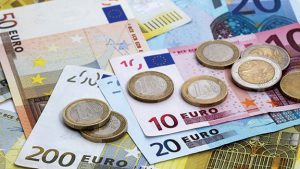The year will be a money milestone. January 1 marks two decades since the first euro banknotes and coins got into people’s pockets. Even anarchic Bitcoiners should care: The euro was the first new currency of the 21st century (though clearly a product of the 20th). It was viewed with skepticism by economists (there was no country called ‘Euroland’, after all). It sought to counter the dominance of the US dollar. And it aimed to banish high inflation and national currency mismanagement to the past. It also came with a lot of heady optimism about peace and prosperity.
The tracker of euro-area financial-market stress shows, the initial euphoria didn’t last, and the sovereign debt crisis of 2011 saw hedge funds openly bet on a collapse of the single currency. But Europe’s handling of Brexit and Covid-19 has been far less messy, and the willingness of Germany to keep walking the path towards more integration — including joint borrowing — means the euro can claim to have reached maturity.
Where things get awkward is that for all the steps taken towards building something close to Euroland, the pandemic is likely to leave economic scars that may build up conflict between the union’s disparate parts in the future. The euro area went into the Covid crisis bearing the mark of a decade of underinvestment, rising debt and public spending cuts. It’s emerging from it with a widening gap relative to the US economy, an uneven North-South divide as tourism recovers slowly, and a debt load
requiring high economic growth and low interest rates to manage.
Euro-area policymakers need to get a lot of things right. Emergency Covid support needs to be lifted carefully; stimulus money has to be spent, both quickly and well, to meet environmental and digital goals; common rules governing debt and deficits need to be rewritten without bad blood. The ECB must also avoid bungling a rise in consumer-price inflation, which hit record levels recently. Emmanuel Macron’s failure to win re-election in France or a Mario Draghi ascendancy to the Italian presidency could make this all harder.
Consumers’ pandemic euphoria around cryptocurrencies is also something for euro architects to take seriously.
This year is unlikely to see a ramp-up in doubts over the euro’s survival. But the currency remains an incomplete “fragile construction,†as academics Paul de Grauwe and Yuemei Ji recently wrote, and it would be a shame if next year’s birthday back-slapping
heralds complacency.
—Bloomberg
 The Gulf Time Newspaper One of the finest business newspapers in the UAE brought to you by our professional writers and editors.
The Gulf Time Newspaper One of the finest business newspapers in the UAE brought to you by our professional writers and editors.
